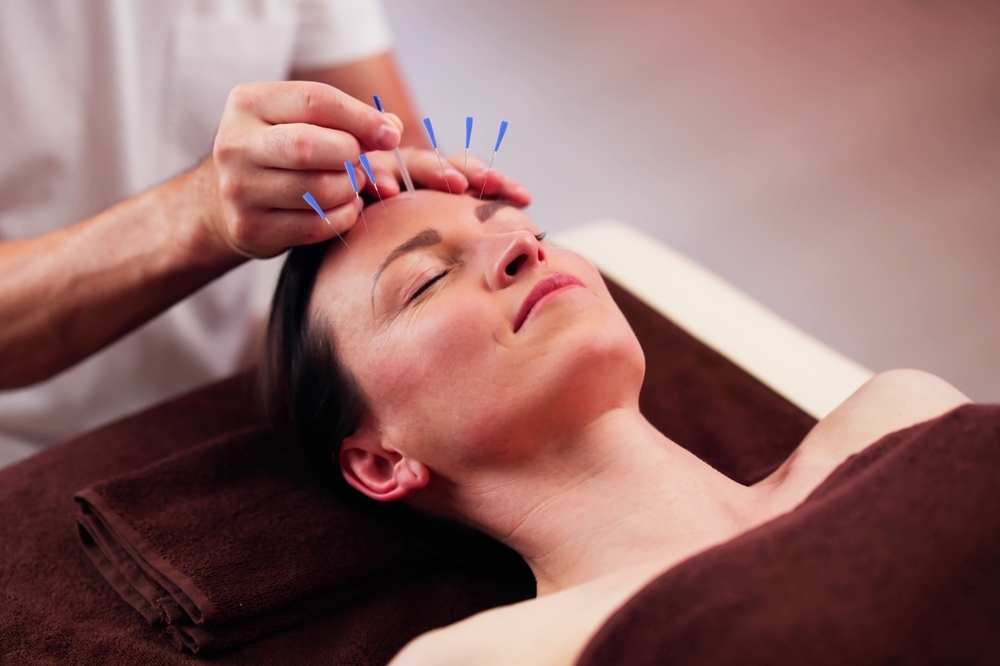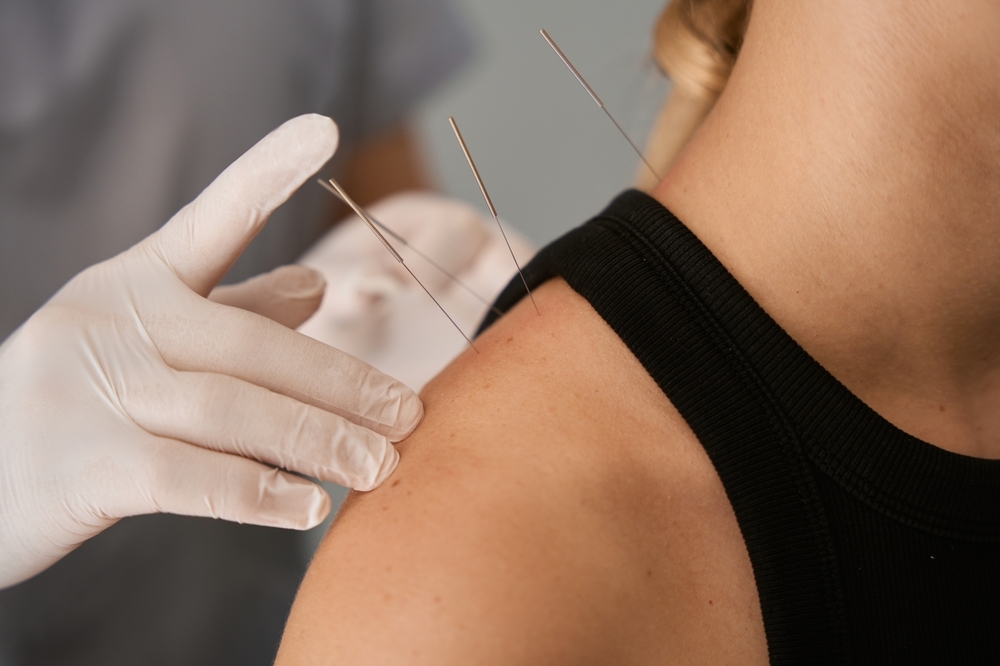Last Updated:
September 10th, 2025
Acupuncture | Addiction Treatment Therapies
Needles and recovery don’t usually go in the same sentence, but acupuncture might be the exception. Once seen as an ancient wellness ritual, it’s now making its way into modern addiction treatment centres across the UK. This page takes a closer look at how acupuncture is being used to support addiction recovery and where it might fit in your recovery journey.

What is acupuncture?
Acupuncture is an ancient healing practice rooted in traditional Chinese medicine. It works by inserting thin needles into specific points across the body, known as acupuncture points. The idea is that these points sit along energy pathways called meridians. According to the original belief system, stimulating these points helps rebalance the flow of energy or “qi”, throughout the body.
While acupuncture has been practised for thousands of years in Eastern medicine, it took longer to gain traction in the West. In recent decades, however, it’s been picked up as a complementary therapy and integrated into many clinical and wellness settings. People turn to it for all sorts of reasons, perhaps for chronic pain relief, migraines, stress reduction and sleep support.
More recently, acupuncture has found its place in the world of addiction recovery. While that’s what we’ll be exploring in detail later, it’s worth noting here just how far-reaching its impact has become.
What are the different types of acupuncture?
Acupuncture isn’t a one-size-fits-all treatment. There are different styles and techniques, each offering its own approach to healing. Some target physical pain. Others are designed to calm the nervous system or support emotional regulation.
Below are some of the more well-known types of acupuncture used today.
Electroacupuncture involves using small clips attached to acupuncture needles. These clips pass gentle electrical currents between the needles, enhancing the stimulation of acupoints. It’s sometimes used for pain relief but recent studies have explored its use in managing symptoms of methamphetamine withdrawal, including psychosis and cravings.
As the name suggests, this type of acupuncture involves inserting needles into specific areas of the scalp. It’s often used in neurological cases, such as post-stroke recovery and for improving cognitive function or motor skills.
Japanese acupuncture follows similar principles to traditional Chinese acupuncture but is generally more subtle. The needles used tend to be thinner and the technique involves gentler insertion with less stimulation. It’s popular among people who may be sensitive to stronger sensations.
TEAS doesn’t use needles at all. Instead, it applies small electrode pads to acupoints on the skin, delivering mild electrical stimulation. This needle-free approach can be especially useful for people in addiction treatment who may feel uncomfortable with needles or who have a history of trauma.
Struggling with an addiction? If you are ready to seek help, reach out to us today, and a member of our compassionate team will help you find the best option for starting your recovery journey.
Does acupuncture work for those with addictions?
There’s growing interest in how acupuncture can support addiction recovery and while it’s not a standalone cure, it may offer meaningful benefits when used alongside structured therapy. Below, we explore what the science says on acupuncture and how effective it really is:
- One exploratory study focused on women attending a 21-day outpatient treatment programme for substance use, anxiety and depression. Those who received auricular acupuncture three times a week reported reduced cravings and lower levels of anxiety and depression. The protocol they followed closely mirrored the widely used NADA protocol.
- Another review looked at nine studies involving over 1,000 participants with opioid use disorder. It found that acupuncture helped reduce withdrawal symptoms, such as cravings, insomnia and mood issues. Electroacupuncture appeared particularly effective at easing depression and cravings, while TEAS was helpful for improving sleep and anxiety levels. That said, the researchers stopped short of saying acupuncture was more effective than standard medication but they did point out the potential for it to support symptoms that medication alone might not address.
- A broader meta-analysis, reviewing 41 studies with over 5,000 participants, highlighted acupuncture’s role in reducing both cravings and anxiety among those with substance use disorders. While it didn’t show a clear effect on relapse rates, the reductions in emotional symptoms could still play a key role in supporting longer-term recovery efforts.
The takeaway here is this: Acupuncture might not be a direct treatment for addiction but it can ease the symptoms that keep people stuck. Cravings, low mood, insomnia, anxiety, all of these can derail recovery. So if acupuncture can help stabilise those experiences, it becomes a powerful complementary tool in the recovery journey.
How do addiction rehab programmes implement acupuncture?
In modern rehab programmes, acupuncture is often offered as part of a wider holistic therapy approach. It’s usually introduced during the therapy phase of treatment, once detox is complete and the person is physically stable. Sessions may be individual or group-based and are usually optional, giving people the chance to explore it on their own terms.
Facilities that offer holistic therapies will typically include acupuncture alongside options like yoga, meditation, massage or nutritional therapy. The goal isn’t to replace clinical treatment but to offer an additional avenue of support, one that engages the body and nervous system directly.
Some people find that acupuncture creates a calm state where it becomes easier to engage with deeper psychological work. Others simply find it helpful for managing lingering withdrawal symptoms like anxiety or sleep problems. For those in early recovery, these small but meaningful changes can make a big difference in staying on track.
Does acupuncture have a role after addiction rehab?
Acupuncture doesn’t have to stop when rehab ends. In fact, some aftercare and recovery support programmes continue offering acupuncture as a regular part of ongoing treatment. This is especially useful in the early months post-rehab, when cravings or mood instability can flare up. Having a familiar tool to return to can offer a sense of continuity and a gentle reminder that recovery is still very much underway.
Interested in acupuncture as part of addiction recovery?
Whether you’re starting your recovery journey or supporting someone else, acupuncture could be a valuable addition. Giving your body and mind extra support to settle is crucial in the recovery stages.
If you’re curious about how acupuncture fits into addiction recovery and want to explore all the treatment options available, Addiction Helper can guide you. We work with rehab centres across the UK that offer acupuncture as part of a wider, tailored programme. Reach out to speak with a trained advisor today.
Our compassionate team are ready and available to take your call, and guide you towards lasting the lasting addiction recovery you deserve.
Frequently Asked Questions
(Click here to see works cited)
- Lee EJ. Effects of auriculotherapy on addiction: a systematic review. J Addict Dis. 2022 Jul-Sep;40(3):415-427. doi: 10.1080/10550887.2021.2016011. Epub 2022 Feb 18. PMID: 35179436.
- Zeng L, Tao Y, Hou W, Zong L, Yu L. Electro-acupuncture improves psychiatric symptoms, anxiety and depression in methamphetamine addicts during abstinence: A randomized controlled trial. Medicine (Baltimore). 2018 Aug;97(34):e11905. doi: 10.1097/MD.0000000000011905. PMID: 30142795; PMCID: PMC6112927.
- Courbasson CM, de Sorkin AA, Dullerud B, Van Wyk L. Acupuncture treatment for women with concurrent substance use and anxiety/depression: an effective alternative therapy? Fam Community Health. 2007 Apr-Jun;30(2):112-20. doi: 10.1097/01.fch.0000264408.36013.03. PMID: 19241647.
- Chen Z, Wang Y, Wang R, Xie J, Ren Y. Efficacy of Acupuncture for Treating Opioid Use Disorder in Adults: A Systematic Review and Meta-Analysis. Evid Based Complement Alternat Med. 2018 Dec 2;2018:3724708. doi: 10.1155/2018/3724708. PMID: 30622598; PMCID: PMC6304557.
- Kitzman JM, Bowman LC, Lin YC. Acupuncture in Addiction Medicine: Its History, Evidence, and Possibilities. Med Acupunct. 2023 Jun 1;35(3):111-116. doi: 10.1089/acu.2023.0021. Epub 2023 Jun 15. PMID: 37361008; PMCID: PMC10282830.


